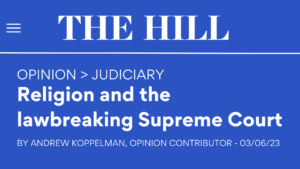Religion and the lawbreaking Supreme Court | The Hill – Column

Lawyers sometimes irritate other people with their persnicketiness about technicalities. But scrupulousness about legal detail is what gives courts their authority. It is big news if the Supreme Court ignores statutory limits on its own power.
Since Justice Amy Coney Barrett replaced Ruth Bader Ginsburg, the Court has repeatedly issued orders without legal authorization. This was particularly true in the cases involving religion and COVID-19.
The pertinent technicality is a provision in the Judiciary Act of 1789. It allows the Supreme Court to issue emergency injunctions in cases where the lower courts, which inevitably are more familiar with the facts of the cases before them, have refused to do so. Cognizant of the danger of uninformed meddling, the Court has for decades interpreted its power very narrowly. In 1968, Justice Potter Stewart declared…Read More
Andrew Koppelman, John Paul Stevens Professor of Law at Northwestern University, is the author of “Burning Down the House: How Libertarian Philosophy Was Corrupted by Delusion and Greed” (St. Martin’s Press). Follow him on Twitter @AndrewKoppelman.